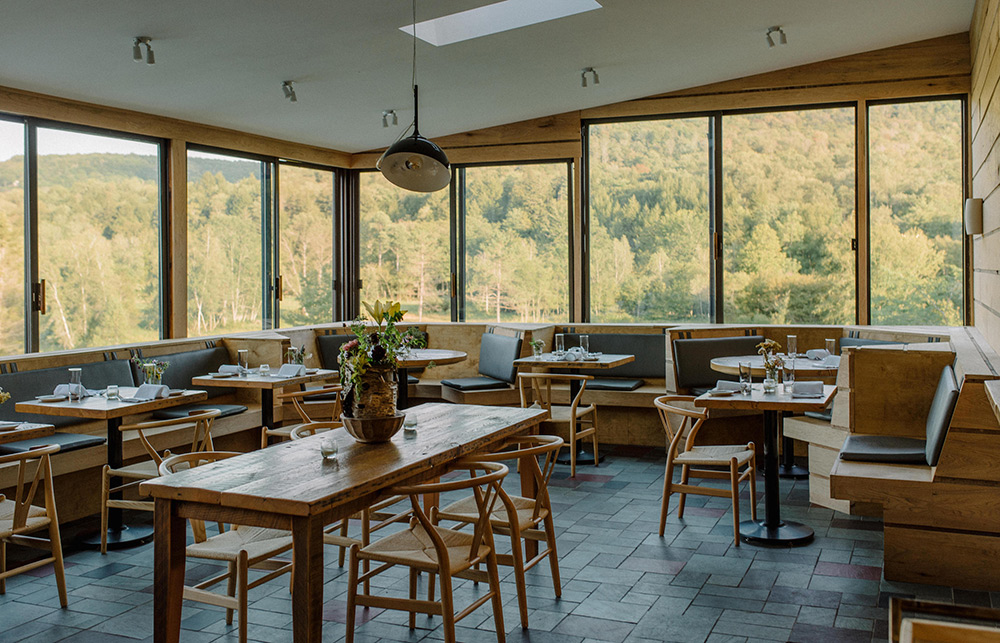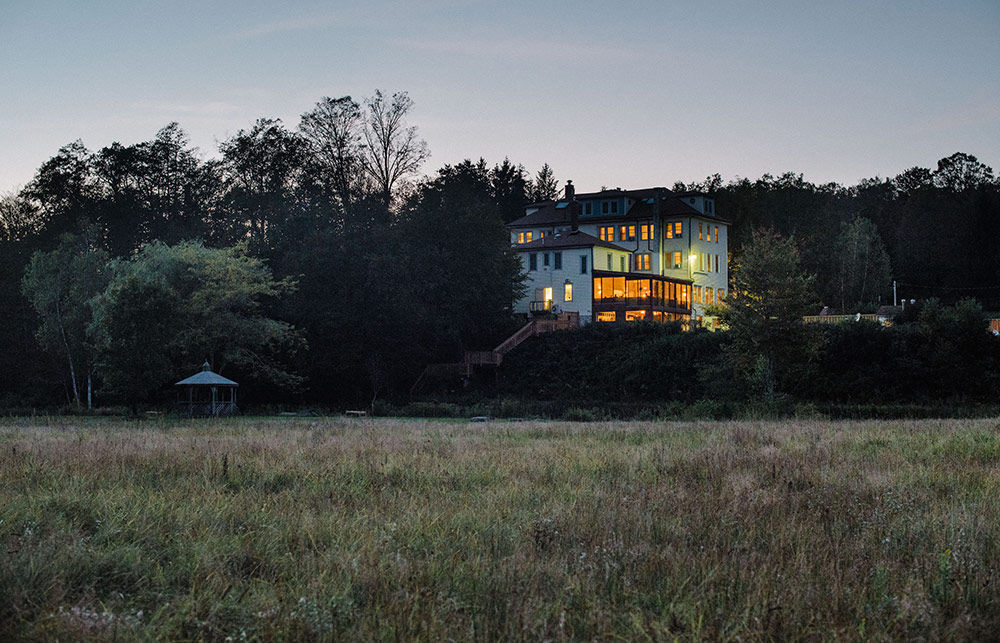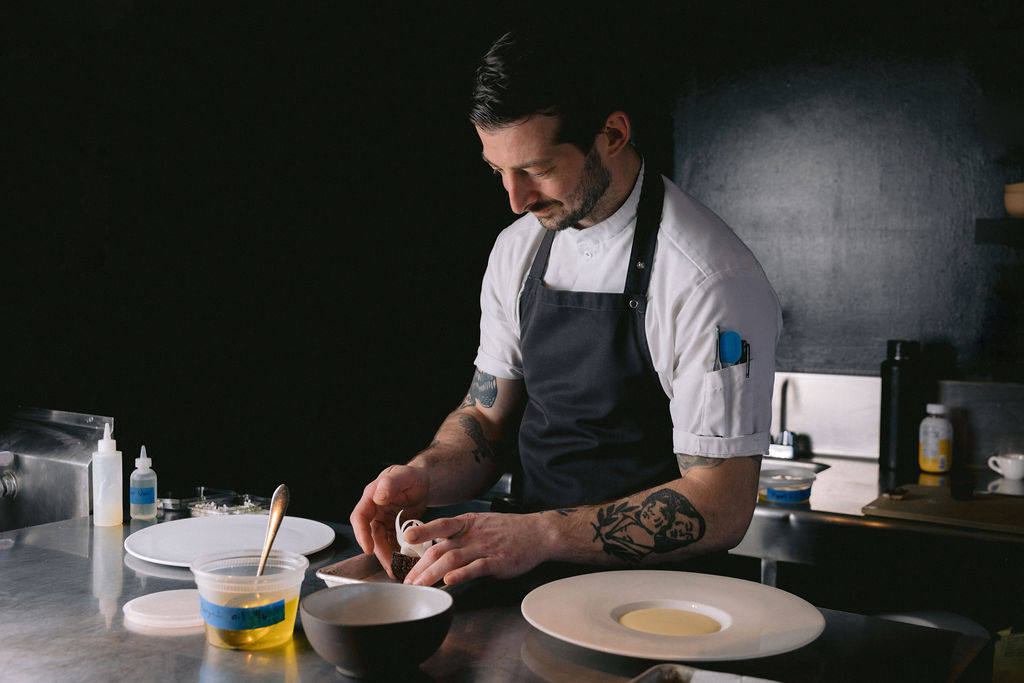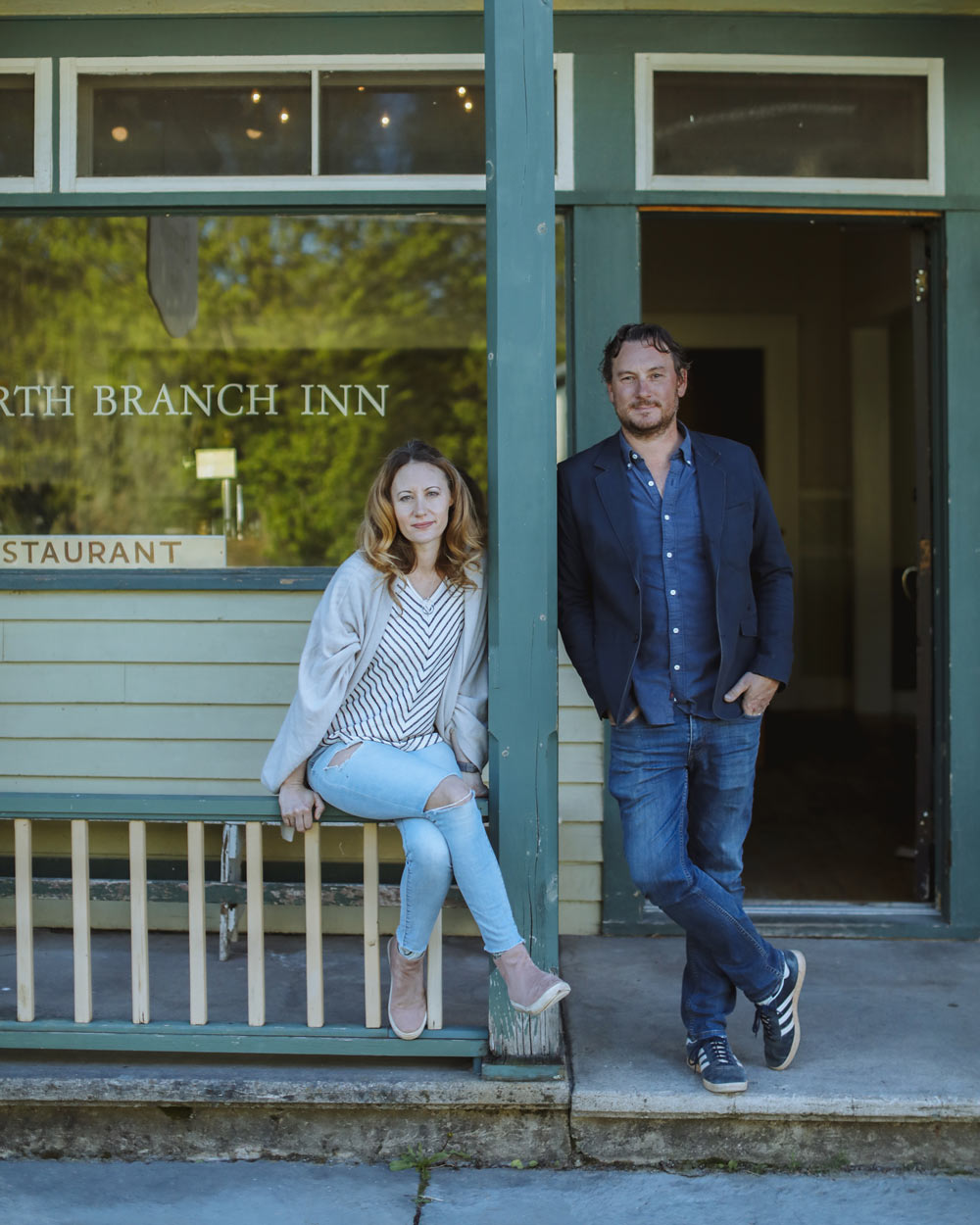
對于一家酒店的經營者來說,在疫情來襲的時候,又失去了一個曾經獲獎的大廚,可謂是雪上加霜。在紐約州的利文斯頓馬諾市的卡茨吉爾山上有一家名叫the DeBruce的酒店,經營該酒店的西姆斯·福斯特和克爾斯滕·哈洛·福斯特夫婦就遭遇了這樣的打擊。
他們在紐約以南約4小時的費城聘請了一位新的行政主廚——埃里克·列維里。列維里接手時是一個“光桿司令”,他立即重組了自己的廚師團隊,就像美劇《火線重案組》第二季的丹尼爾斯警官一樣。他的目標很明確——他追求的是一種慢節奏的生活方式,一份收入頗豐的工作,同時還能制作精致的本地美食(比如菌菇豬臉、鵝肝派,楓糖烤梨等等)。目前,這間現代的鄉村酒店雇傭了7名費城員工,下一步還將招募更多員工。
下面,我們就讓故事的主人公來親自講述這個小巧精干的“鷹巢”酒店向北遷徙的故事。
為簡明起見,采訪有刪節。

西姆斯·福斯特,福斯特酒店公司老板:疫情剛開始的時候,上一任行政總廚阿克塞找到我,跟我說他因為家庭原因要走了。他是一個特別有才華的廚師,當時我的心都碎了。但他臨走的時候,已經在悄悄替我物色接替他的人了。他說:“你還記得埃里克嗎,兩年前在這幫過廚。”
埃里克·列維里,福斯特酒店公司烹飪總監,DeBruce酒店行政總廚:2019年,我給阿克塞當過幫廚,我原來從沒來過卡茨吉爾山,但DeBruce酒店曾被《時尚先生》雜志評為美國最好的餐廳之一,這吸引了我的注意。我一直很喜歡這種風格的餐廳——它有點像世界著名的瑞典F?vikens餐廳,與環境融合得特別好。我真的很喜歡這里,但當時我已經在費城的黎頓豪斯酒店的Lacroix餐廳得到了另一份工作,所以我還是留在了費城。“
福斯特:我永遠不會忘記阿克塞說過的話:“作為一個廚師,埃里克可能比我更出色。”他是懷著敬意說這番話的。這句話分量很重,所以我給埃里克打了電話。
列維里:疫情剛開始的時候,我是Lacroix餐廳的主廚。很快費城的所有商家都關門了,我也不知道黎頓豪斯酒店的情況是怎樣的。我團隊的大部人都到一個農產品包裝倉庫找了份工作。

帕特里克·博恩斯,DeBruce酒店副廚師長:3月15日,我們接到了Lacroix餐廳的停業休假通知。到5月1日左右,大多數人的休假成了永久休假。再往后,所有餐館都關門了,所以我們大多數人都開始在一個農產品包裝廠里工作,因為已經沒有地方需要廚師了。
列維里:我一直和阿克塞保持聯系。他告訴我,他想讓我聯系西姆斯,爭取一些機會。我根本不知道那是什么機會。后來西姆斯給我打了電話,說阿克塞要離開了,我可以得到一個行政總廚的職位。這就開啟了一次完全不同的對話。
福斯特::2014年,我們開辦了第一家酒店——阿諾德之家(Arnold House),當時要招募員工到卡茨吉爾山來工作是很難的。以前在我們這個行業,如果你想成為一名真正的廚師,或者你想真正在酒店行業發展,你必須去大城市。但我們越來越多地看到,人們厭倦了城市的生活,他們覺得:“這不是我下半輩子想要的生活方式。”疫情加速了這些根本性的變化,并且讓人們有了更合理的借口逃離城市,去追尋一直以來內心渴望的東西。
列維里:我沒有因為覺得要離開這座城市,所以就感到有些恐慌。第一次來這里的感覺是很好的,我們看著這片美麗的土地,四處走走,采采野花——當然我對此感到很內疚。
福斯特:早在“保持社交距離”成為一個成語之前,我們就在宣傳這個理念。現在全世界終于相信了。
列維里:我很快就接受了這份工作,但當時好像一切都在跟我們對著干。我和我妻子蒂法當時剛訂了婚,正準備結婚。我們剛在新房里住了兩個月。她簽了一份合同,還得在普林斯頓再工作一年。不過我們在費城倒是沒有什么事,所以如果非要冒一個險的話,當時似乎正是時候。
福斯特:于是我和埃里克談了一談。
列維里:那是一個非常獨特的招聘過程,因為我當時甚至沒法再過去一次了。我完全不知道上次我幫廚結束后發生了什么。
福斯特:他甚至沒辦法過來試菜。
列維里:防疫措施太嚴格了,大家一開始都嚇壞了,所以我沒法去試菜。我們倒是在電話里聊了很多。坦白說,我們大部分對話都跟做菜沒關系。我們談了很多生活中重要的事情,通過這種方法,我們建立了一種真正的聯系。

克里斯汀·哈洛·福斯特,福斯特酒店公司老板:和埃里克聊了幾次之后,我在西姆斯的眼中看到了一絲光芒。
福斯特:當時之所以決定聘用埃里克,是由于他的個性。所以搞笑的是,當他一個月來到這里后,我說:“好吧,至少現在我知道你是會做菜的。”
博恩斯:說實話,當時我以為埃里克瘋了。我當時想:“這真是一個大膽的決定。”
哈洛·福斯特:從各方面看,雙方都有賭的成分,完全是出于對彼此的信任。埃里克甚至沒有見過我們本人,就搬到了一個陌生的地方。而且這個地方是什么樣的,你在疫情期間是很難了解的。
列維里:我5月份剛搬來的時候,廚房完全是空的。不過我手下有一兩個之前的團隊留下來的員工。
福斯特:我和埃里克在電話里敲定了這件事后,下一句話就是:“讓我們談談怎么幫你招募你需要的人手。”我們在電梯里的廣告詞是:“放假的時候,你是想在紐約西村吃早餐,還是想去劃船或遠足?”
朱利安·邁耶,DeBruce行政副廚:我一直以為,要追求烹飪事業,我就必須犧牲在戶外的時間。當埃里克告訴我,在這個荒無人煙的地方,還有這樣一個瘋狂的機會時,說實話,我覺得這個機會簡直好得難以置信。
列維里:我和朱利安在我干過的每一家餐廳都共事過,但我們沒有真正搭檔過。我知道他住在科羅拉多州,而且對戶外風格的生活很感興趣。他也是我第一個聯系的人。實際上,是蒂法聯系了他。
邁耶:我和蒂法三年多前曾在費城的Zahav餐廳共事過。去年四月,也就是疫情最嚴重的時候,她給我發了一條信息。當時我正要開始一份新的廚師管理工作,到新公司報到那天,恰好就是費城所有餐館關門那天,實在太可怕了。我工作過的每一家餐廳,都是一直需要廚師的。我一直覺得這里的就業市場超級穩定。但疫情完全顛覆了這一切。我原來以為自己隨便走進一家餐廳都能找到工作,現在卻有了走投無路的感覺。我當始還在申請上大學。所以埃里克提供這份工作的時機真是太及時了。大概沒到三個星期,我就收拾東西開車趕了過來。直到我領鑰匙準備搬進新住處時,我才第一次看見這家餐廳。這個公司在道路盡頭有一棟房子,我們很多廚房員工都住在那里。
哈洛·福斯特:我們消除的障礙越多,就越容易幫助員工北上,在招聘上也就越容易成功。為了這個戰略,我們為員工提供了6個月的臨時住房。這也給了新團隊成員一些時間,讓他們熟悉這個地區,好讓他們決定,以后把家安在旁邊哪個生機勃勃的小鎮或村莊里。
邁耶:這讓過渡變得很順利。我們可以免費住在這兒,我不禁會想:“最壞又能差到哪去呢?”我只在那兒待了很短一段時間,現在我和我的女朋友住在一個農場里,我們的食材就是從那里來的。
福斯特:這也是我們最吸引廚房員工的地方之一。在上班的路上,你會路過三個農場,你可以跟他們探討一下你將要烹飪的食材。
列維里:從朱利安開始,它就像一張網一樣蔓延開來。
福斯特:DeBruce的戰略,是給大廚創造一個平臺,來展現他的創造力,然后讓他去影響他招募來的人。這樣做的效果很好,因為他們會告訴人們:“快搬到鄉村吧,這是一種很好的生活方式,更重要的是,這是一次改變職業發展的機會。”
本尼森·謝:DeBruce服務經理:埃里克和我起初是在Whetstone Tavern餐廳共事時認識的,當時我是一個傳菜生,而埃里克和我共事過的其他廚師都不一樣。他充滿了激情和創造力,是一個你愿意追隨的人。
列維里:本跟了我6年,干過好幾個不同的角色。這種人會成為你的朋友,因為你們之間有信任。他知道我只會把他帶到更好的處境里。
謝:埃里克知道,我已經有些厭倦了城市生活,早在疫情前,我就夢想一種放松的、遠離喧囂的生活。他也知道我很向往酒店行業。我本來是想2020年年底與他會合的,不過他在夏天的時候就早早聯系了我,讓我填補一個空缺的職位。他說:“我覺得這份工作很適合你。”所以我沒有猶豫。
安德魯·由斯特,Kenoza Hall酒吧經理:埃里克和我也是幾年前在Whetstone餐廳認識的。有一天他突然提出來,要我加入DeBruce的服務團隊。后來這家公司也找到了我,提出讓我當Kenoza Hall的酒吧經理,那是一家最新的酒店。
基爾頓·凱勒,DeBruce服務員:這一年改變了安德魯和我的關系,我們成了情侶,然后我們有了一次嚴肅的討論:“好吧,我們要一起做這件事嗎?”
尤斯特:除了賓西法尼亞州,我沒住過別的地方,比如東南賓西法尼亞。
凱勒:我的背景是服裝設計,我知道,等疫情平穩后,我可以重新撿起這個職業,但這是安德魯進入管理界的第一步。所以我認為,為了他的事業發展,也為了我們的未來,來這里工作,對我們倆來說是正確的決定。
哈洛·福斯特:我不知道是不是因為西姆斯和我既是夫妻、也是生意伙伴的緣故——我們在生活上事業上都是戰友,但是,我們公司里確實有很多對情侶。當我們招了一個人后,就會弄清他另一半的情況,而他的另一半往往也適合我們的職位。
博恩斯:這是一個詭異的夏天。費城的餐飲業一片蕭條。我當時在費蒙特公園里賣簡餐,我的同事曾在Vetri餐廳當過廚師。我們一個是Vetri的廚師,一個是Lacroix的廚師,現在竟然淪落到在快餐車里賣卷餅和熱狗。
羅伯特·韋斯特,DeBruce助理廚師:我在我朋友的甜甜圈店工作。我還給一家啤酒廠工作,主要是做外賣。我是盡可能地想繼續工作賺錢,你知道嗎?
杰弗里·戴維森,DeBruce助理廚師:我想方設法地維持生計,甚至連包裝的工作都干。我還在一家餐廳工作,但他們每周只干兩天,我靠它根本沒法生活。后來我在里士滿港的一家小酒吧里當上了廚師。
博恩斯:城市里的很多人只能打食品打包帶走吃,這些食品和我們以前做的東西根本不能相提并論。大概8月的時候,埃里克打電話告訴我,說這里有個助理廚師的職位。那個時候,在城市里,你根本沒有讓人坐下來吃一頓11道菜的西餐的自由。這份工作可以讓我們繼續磨練手藝。所以我就來了,這一走就沒有離開。
韋斯特:我是在Zahav餐廳認識蒂法和朱利安的,我的上一任助理廚師則跟埃里克共事過很久。我通過小道消息聽說埃里克和朱利安來了這里,所以我也開始跟朱利安談這件事。他讓我用電子郵件把簡歷發給埃里克。我相信朱利安,所以我知道,如果他真的愿意為埃里克工作,那我可能也會。我很喜歡城市生活,我在《費城問詢報》的新聞部門工作了15年,當廚師卻只有3年。我已經45歲了,是廚房里的老家伙。不過只要向埃里克學習,決定搬家就沒有什么難的。
戴維森:我是廚房里年齡最小的一個,我幾乎所有的知識,都是從埃里克那里學來的。我一直都跟著他,從Marigold Kitchen餐廳到Lacroix餐廳。當時,我和帕特每天都搭檔工作。不過我是經歷了一番勸說才搬到這里的。等到埃里克第三次問我時,我開車來到了這里,那時冬天都要過去了。我的車是前驅的,在開車來的路上,冰雪還把我車子的制動功能弄壞了。
福斯特:一次我問幾個潛在員工:“你對冬天怎么看?”因為這里真的是有冬天的。
戴維森:我來晚了一天,不過還是成功了。兩周前,我和我女朋友帶著我們的狗和貓搬了過來。
博恩斯:原Lacroix餐廳的團隊還有更多人加入進來。這就像埃里克在疫情前召集他的舊團隊一樣。
列維里:跟著領導走,并不一定是餐飲行業的獨特習慣。不過你不管走到那里,都能帶來10到12個人,這種感覺很奇怪,但也很有成就感。
戴維森:這里非常注重團隊合作。這種感覺很好,因為你會覺得有人在支持你,而不是僅僅為了活著而掙扎。我們會坐下來一起吃工作餐。我們還會討論休息日怎么一起出去玩。我們在都以費城的那種奇怪的方式聯系在一起。
博恩斯:費城一向被視為紐約的小兄弟,尤其是在美食上。現在我們有很多事情要證明,而且我們已經殺到了紐約的后院。
列維里:在弗城這樣的大城市,幾乎所有的廚師,幾乎都有陷入自我懷疑的問題。因為大城市有很多美食媒體和餐廳,我必須要跟他們比……我很享受現在這種距離感。現在我只專注于和我的團隊在一起,做我們喜歡的食物,并確保我們做出來的,都是我們相信的美食。我一度曾經認為我是世界上最糟糕的廚師,但現在大家都愿意在這里工作,或許說明我以前的感覺并不正確。(財富中文網)
譯者:樸成奎
對于一家酒店的經營者來說,在疫情來襲的時候,又失去了一個曾經獲獎的大廚,可謂是雪上加霜。在紐約州的利文斯頓馬諾市的卡茨吉爾山上有一家名叫the DeBruce的酒店,經營該酒店的西姆斯·福斯特和克爾斯滕·哈洛·福斯特夫婦就遭遇了這樣的打擊。
他們在紐約以南約4小時的費城聘請了一位新的行政主廚——埃里克·列維里。列維里接手時是一個“光桿司令”,他立即重組了自己的廚師團隊,就像美劇《火線重案組》第二季的丹尼爾斯警官一樣。他的目標很明確——他追求的是一種慢節奏的生活方式,一份收入頗豐的工作,同時還能制作精致的本地美食(比如菌菇豬臉、鵝肝派,楓糖烤梨等等)。目前,這間現代的鄉村酒店雇傭了7名費城員工,下一步還將招募更多員工。
下面,我們就讓故事的主人公來親自講述這個小巧精干的“鷹巢”酒店向北遷徙的故事。
為簡明起見,采訪有刪節。
西姆斯·福斯特,福斯特酒店公司老板:疫情剛開始的時候,上一任行政總廚阿克塞找到我,跟我說他因為家庭原因要走了。他是一個特別有才華的廚師,當時我的心都碎了。但他臨走的時候,已經在悄悄替我物色接替他的人了。他說:“你還記得埃里克嗎,兩年前在這幫過廚。”
埃里克·列維里,福斯特酒店公司烹飪總監,DeBruce酒店行政總廚:2019年,我給阿克塞當過幫廚,我原來從沒來過卡茨吉爾山,但DeBruce酒店曾被《時尚先生》雜志評為美國最好的餐廳之一,這吸引了我的注意。我一直很喜歡這種風格的餐廳——它有點像世界著名的瑞典F?vikens餐廳,與環境融合得特別好。我真的很喜歡這里,但當時我已經在費城的黎頓豪斯酒店的Lacroix餐廳得到了另一份工作,所以我還是留在了費城。“
福斯特:我永遠不會忘記阿克塞說過的話:“作為一個廚師,埃里克可能比我更出色。”他是懷著敬意說這番話的。這句話分量很重,所以我給埃里克打了電話。
列維里:疫情剛開始的時候,我是Lacroix餐廳的主廚。很快費城的所有商家都關門了,我也不知道黎頓豪斯酒店的情況是怎樣的。我團隊的大部人都到一個農產品包裝倉庫找了份工作。
帕特里克·博恩斯,DeBruce酒店副廚師長:3月15日,我們接到了Lacroix餐廳的停業休假通知。到5月1日左右,大多數人的休假成了永久休假。再往后,所有餐館都關門了,所以我們大多數人都開始在一個農產品包裝廠里工作,因為已經沒有地方需要廚師了。
列維里:我一直和阿克塞保持聯系。他告訴我,他想讓我聯系西姆斯,爭取一些機會。我根本不知道那是什么機會。后來西姆斯給我打了電話,說阿克塞要離開了,我可以得到一個行政總廚的職位。這就開啟了一次完全不同的對話。
福斯特::2014年,我們開辦了第一家酒店——阿諾德之家(Arnold House),當時要招募員工到卡茨吉爾山來工作是很難的。以前在我們這個行業,如果你想成為一名真正的廚師,或者你想真正在酒店行業發展,你必須去大城市。但我們越來越多地看到,人們厭倦了城市的生活,他們覺得:“這不是我下半輩子想要的生活方式。”疫情加速了這些根本性的變化,并且讓人們有了更合理的借口逃離城市,去追尋一直以來內心渴望的東西。
列維里:我沒有因為覺得要離開這座城市,所以就感到有些恐慌。第一次來這里的感覺是很好的,我們看著這片美麗的土地,四處走走,采采野花——當然我對此感到很內疚。
福斯特:早在“保持社交距離”成為一個成語之前,我們就在宣傳這個理念。現在全世界終于相信了。
列維里:我很快就接受了這份工作,但當時好像一切都在跟我們對著干。我和我妻子蒂法當時剛訂了婚,正準備結婚。我們剛在新房里住了兩個月。她簽了一份合同,還得在普林斯頓再工作一年。不過我們在費城倒是沒有什么事,所以如果非要冒一個險的話,當時似乎正是時候。
福斯特:于是我和埃里克談了一談。
列維里:那是一個非常獨特的招聘過程,因為我當時甚至沒法再過去一次了。我完全不知道上次我幫廚結束后發生了什么。
福斯特:他甚至沒辦法過來試菜。
列維里:防疫措施太嚴格了,大家一開始都嚇壞了,所以我沒法去試菜。我們倒是在電話里聊了很多。坦白說,我們大部分對話都跟做菜沒關系。我們談了很多生活中重要的事情,通過這種方法,我們建立了一種真正的聯系。
克里斯汀·哈洛·福斯特,福斯特酒店公司老板:和埃里克聊了幾次之后,我在西姆斯的眼中看到了一絲光芒。
福斯特:當時之所以決定聘用埃里克,是由于他的個性。所以搞笑的是,當他一個月來到這里后,我說:“好吧,至少現在我知道你是會做菜的。”
博恩斯:說實話,當時我以為埃里克瘋了。我當時想:“這真是一個大膽的決定。”
哈洛·福斯特:從各方面看,雙方都有賭的成分,完全是出于對彼此的信任。埃里克甚至沒有見過我們本人,就搬到了一個陌生的地方。而且這個地方是什么樣的,你在疫情期間是很難了解的。
列維里:我5月份剛搬來的時候,廚房完全是空的。不過我手下有一兩個之前的團隊留下來的員工。
福斯特:我和埃里克在電話里敲定了這件事后,下一句話就是:“讓我們談談怎么幫你招募你需要的人手。”我們在電梯里的廣告詞是:“放假的時候,你是想在紐約西村吃早餐,還是想去劃船或遠足?”
朱利安·邁耶,DeBruce行政副廚:我一直以為,要追求烹飪事業,我就必須犧牲在戶外的時間。當埃里克告訴我,在這個荒無人煙的地方,還有這樣一個瘋狂的機會時,說實話,我覺得這個機會簡直好得難以置信。
列維里:我和朱利安在我干過的每一家餐廳都共事過,但我們沒有真正搭檔過。我知道他住在科羅拉多州,而且對戶外風格的生活很感興趣。他也是我第一個聯系的人。實際上,是蒂法聯系了他。
邁耶:我和蒂法三年多前曾在費城的Zahav餐廳共事過。去年四月,也就是疫情最嚴重的時候,她給我發了一條信息。當時我正要開始一份新的廚師管理工作,到新公司報到那天,恰好就是費城所有餐館關門那天,實在太可怕了。我工作過的每一家餐廳,都是一直需要廚師的。我一直覺得這里的就業市場超級穩定。但疫情完全顛覆了這一切。我原來以為自己隨便走進一家餐廳都能找到工作,現在卻有了走投無路的感覺。我當始還在申請上大學。所以埃里克提供這份工作的時機真是太及時了。大概沒到三個星期,我就收拾東西開車趕了過來。直到我領鑰匙準備搬進新住處時,我才第一次看見這家餐廳。這個公司在道路盡頭有一棟房子,我們很多廚房員工都住在那里。
哈洛·福斯特:我們消除的障礙越多,就越容易幫助員工北上,在招聘上也就越容易成功。為了這個戰略,我們為員工提供了6個月的臨時住房。這也給了新團隊成員一些時間,讓他們熟悉這個地區,好讓他們決定,以后把家安在旁邊哪個生機勃勃的小鎮或村莊里。
邁耶:這讓過渡變得很順利。我們可以免費住在這兒,我不禁會想:“最壞又能差到哪去呢?”我只在那兒待了很短一段時間,現在我和我的女朋友住在一個農場里,我們的食材就是從那里來的。
福斯特:這也是我們最吸引廚房員工的地方之一。在上班的路上,你會路過三個農場,你可以跟他們探討一下你將要烹飪的食材。
列維里:從朱利安開始,它就像一張網一樣蔓延開來。
福斯特:DeBruce的戰略,是給大廚創造一個平臺,來展現他的創造力,然后讓他去影響他招募來的人。這樣做的效果很好,因為他們會告訴人們:“快搬到鄉村吧,這是一種很好的生活方式,更重要的是,這是一次改變職業發展的機會。”
本尼森·謝:DeBruce服務經理:埃里克和我起初是在Whetstone Tavern餐廳共事時認識的,當時我是一個傳菜生,而埃里克和我共事過的其他廚師都不一樣。他充滿了激情和創造力,是一個你愿意追隨的人。
列維里:本跟了我6年,干過好幾個不同的角色。這種人會成為你的朋友,因為你們之間有信任。他知道我只會把他帶到更好的處境里。
謝:埃里克知道,我已經有些厭倦了城市生活,早在疫情前,我就夢想一種放松的、遠離喧囂的生活。他也知道我很向往酒店行業。我本來是想2020年年底與他會合的,不過他在夏天的時候就早早聯系了我,讓我填補一個空缺的職位。他說:“我覺得這份工作很適合你。”所以我沒有猶豫。
安德魯·由斯特,Kenoza Hall酒吧經理:埃里克和我也是幾年前在Whetstone餐廳認識的。有一天他突然提出來,要我加入DeBruce的服務團隊。后來這家公司也找到了我,提出讓我當Kenoza Hall的酒吧經理,那是一家最新的酒店。
基爾頓·凱勒,DeBruce服務員:這一年改變了安德魯和我的關系,我們成了情侶,然后我們有了一次嚴肅的討論:“好吧,我們要一起做這件事嗎?”
尤斯特:除了賓西法尼亞州,我沒住過別的地方,比如東南賓西法尼亞。
凱勒:我的背景是服裝設計,我知道,等疫情平穩后,我可以重新撿起這個職業,但這是安德魯進入管理界的第一步。所以我認為,為了他的事業發展,也為了我們的未來,來這里工作,對我們倆來說是正確的決定。
哈洛·福斯特:我不知道是不是因為西姆斯和我既是夫妻、也是生意伙伴的緣故——我們在生活上事業上都是戰友,但是,我們公司里確實有很多對情侶。當我們招了一個人后,就會弄清他另一半的情況,而他的另一半往往也適合我們的職位。
博恩斯:這是一個詭異的夏天。費城的餐飲業一片蕭條。我當時在費蒙特公園里賣簡餐,我的同事曾在Vetri餐廳當過廚師。我們一個是Vetri的廚師,一個是Lacroix的廚師,現在竟然淪落到在快餐車里賣卷餅和熱狗。
羅伯特·韋斯特,DeBruce助理廚師:我在我朋友的甜甜圈店工作。我還給一家啤酒廠工作,主要是做外賣。我是盡可能地想繼續工作賺錢,你知道嗎?
杰弗里·戴維森,DeBruce助理廚師:我想方設法地維持生計,甚至連包裝的工作都干。我還在一家餐廳工作,但他們每周只干兩天,我靠它根本沒法生活。后來我在里士滿港的一家小酒吧里當上了廚師。
博恩斯:城市里的很多人只能打食品打包帶走吃,這些食品和我們以前做的東西根本不能相提并論。大概8月的時候,埃里克打電話告訴我,說這里有個助理廚師的職位。那個時候,在城市里,你根本沒有讓人坐下來吃一頓11道菜的西餐的自由。這份工作可以讓我們繼續磨練手藝。所以我就來了,這一走就沒有離開。
韋斯特:我是在Zahav餐廳認識蒂法和朱利安的,我的上一任助理廚師則跟埃里克共事過很久。我通過小道消息聽說埃里克和朱利安來了這里,所以我也開始跟朱利安談這件事。他讓我用電子郵件把簡歷發給埃里克。我相信朱利安,所以我知道,如果他真的愿意為埃里克工作,那我可能也會。我很喜歡城市生活,我在《費城問詢報》的新聞部門工作了15年,當廚師卻只有3年。我已經45歲了,是廚房里的老家伙。不過只要向埃里克學習,決定搬家就沒有什么難的。
戴維森:我是廚房里年齡最小的一個,我幾乎所有的知識,都是從埃里克那里學來的。我一直都跟著他,從Marigold Kitchen餐廳到Lacroix餐廳。當時,我和帕特每天都搭檔工作。不過我是經歷了一番勸說才搬到這里的。等到埃里克第三次問我時,我開車來到了這里,那時冬天都要過去了。我的車是前驅的,在開車來的路上,冰雪還把我車子的制動功能弄壞了。
福斯特:一次我問幾個潛在員工:“你對冬天怎么看?”因為這里真的是有冬天的。
戴維森:我來晚了一天,不過還是成功了。兩周前,我和我女朋友帶著我們的狗和貓搬了過來。
博恩斯:原Lacroix餐廳的團隊還有更多人加入進來。這就像埃里克在疫情前召集他的舊團隊一樣。
列維里:跟著領導走,并不一定是餐飲行業的獨特習慣。不過你不管走到那里,都能帶來10到12個人,這種感覺很奇怪,但也很有成就感。
戴維森:這里非常注重團隊合作。這種感覺很好,因為你會覺得有人在支持你,而不是僅僅為了活著而掙扎。我們會坐下來一起吃工作餐。我們還會討論休息日怎么一起出去玩。我們在都以費城的那種奇怪的方式聯系在一起。
博恩斯:費城一向被視為紐約的小兄弟,尤其是在美食上。現在我們有很多事情要證明,而且我們已經殺到了紐約的后院。
列維里:在弗城這樣的大城市,幾乎所有的廚師,幾乎都有陷入自我懷疑的問題。因為大城市有很多美食媒體和餐廳,我必須要跟他們比……我很享受現在這種距離感。現在我只專注于和我的團隊在一起,做我們喜歡的食物,并確保我們做出來的,都是我們相信的美食。我一度曾經認為我是世界上最糟糕的廚師,但現在大家都愿意在這里工作,或許說明我以前的感覺并不正確。(財富中文網)
譯者:樸成奎
Inside the dining room at the DeBruce.LAWRENCE BRAUN
Losing your award-winning chef is not a great way for hoteliers to begin a pandemic. But that’s exactly what happened to Sims Foster and Kirsten Harlow Foster, the first couple of third-wave Catskills hospitality, at their culinary-focused property, the DeBruce, in the mountain hollow of Livingston Manor, N.Y.
They found their new executive chef, Eric Leveillee, four hours south in Philadelphia. Leveillee inherited a ghost kitchen and immediately began reassembling his old team like Lieutenant Daniels in the second season of The Wire. The pitch was straightforward: a slower, outdoors lifestyle and gainful employment, with the ability to cook the kind of intricate, place-rooted cuisine (truffled pork cheek and foie gras pie; embers-roasted pear glazed in birch syrup) that had vanished in cities during the shutdown. At current count, this modern country inn employs seven former Philadelphians, with more on the way.
Here’s the story of how this tight-knit Eagles nest made its way north, in their own words.
These interviews have been lightly edited and condensed for clarity.
Sims Foster, owner, Foster Supply Hospitality: At the very beginning of the pandemic, Aksel [Theilkuhl, former executive chef of the DeBruce] came to me and told me he was leaving for family reasons. He was immensely talented, and my heart was broken. But as he was leaving, he was softly recruiting his replacement. He said, “Do you remember Eric, the guy who staged two years ago?”
Eric Leveillee, culinary director, Foster Supply Hospitality, and executive chef, the DeBruce: I staged for Aksel for a sous chef position in 2019. I had never been to the Catskills before, but the DeBruce was named one of the best restaurants in the country in Esquire, and that piqued my attention. I’ve always loved this style of restaurant—the F?vikens of the world, just very in touch with their surroundings. I really loved it up here, but I got another offer, to work at Lacroix at the Rittenhouse [hotel], and it was too good to pass up, so I wound up staying in Philly.
Foster: I’ll never forget what Aksel said: “Eric might be a better cook than me.” He said it with reverence. It carried a lot of weight. So I called Eric.
Leveillee: I was chef de cuisine at Lacroix when the pandemic hit. Everything in Philly was totally shut down, and I had no idea what was going on with the Rittenhouse. Most of my team, we all took jobs at a produce packing warehouse.
Patrick Bones, sous chef, the DeBruce: We were furloughed from Lacroix on March 15, and that furlough was made into a permanent level for most of us around May 1. After that, all the restaurants were closed, so most of us got jobs at a produce packing plant because there was nowhere to cook or serve.
Leveillee: I had stayed in touch with Aksel, and he told me that he wanted to put me in touch with Sims about some opportunity. I had no idea what it was. When Sims called and told me Aksel was actually leaving and the [executive chef] position was available, that opened up a whole different conversation.
Foster: When we opened our first hotel, the Arnold House, in 2014, it was really, really tough [to recruit staff to relocate to the Catskills]. It used to be in our industry, if you wanted to be a serious chef or serious in hospitality you had to be in [a big city]. But more and more we’re seeing people do their time in the city and say, “That’s not the lifestyle I want for the rest of my life.” The pandemic has accelerated these fundamental changes and has actually given people a more reasonable excuse to flee the city and pursue probably what was in their hearts all along.
Leveillee: I wasn’t panicking like, “Oh, I need to get out of this city,” but it was really nice. I remember when we first came up here, we were looking across the beautiful land, walking around, picking wildflowers. I felt very guilty about it.
Foster: We’ve been touting social distancing before it was even a term, and now the world has caught up.
Leveillee: I was sold on [the job] pretty immediately, but every possible thing was kind of lined up against us. My wife, Deva, and I were recently engaged and about to get married. We had been in our new house for two months. She was contracted to work in Princeton for another year. But there was nothing going on for us in Philly, so if there was ever a time to take a risk, it seemed like this was the time.
Foster: Eric and I started talking.
Leveillee: It was a very unique recruitment process because I couldn’t see the restaurant again. I had no idea what had occurred since my stage.
Foster: He couldn’t even come to a tasting.
Leveillee: COVID protocols were so strict, and everybody was so freaked out in the very beginning that it was just not possible. So we chatted a lot on the phone, and, honestly, most of our conversations weren’t about food. We talked a lot about all the other things that we find important in life, and I think that we made a real connection in that way.
Kirsten Harlow Foster, owner, Foster Supply Hospitality: I saw a little glimmer in [Sims’s] eyes after talking to Eric a few times.
Foster: The judgment to hire Eric was based off personality, so the big joke was when he got here, after about a month, I said, “Well, at least I know you can cook now.”
Bones: I’m not gonna lie, I thought Eric was crazy. I was like, “That’s a really bold move.”
Harlow Foster: It was a leap-of-faith moment on all sides. Eric hadn’t even met us in person, and he moved to an area that it was very hard to get to know [during a pandemic].
Leveillee: I moved up in May and walked into a totally empty kitchen. I had one or two staff members that remained from the previous team.
Foster: Probably as soon as Eric and I agreed on the phone that he was going to take the job, I’m sure the next sentence was, “Let’s talk about how I help you recruit the people you need to bring.” Our elevator pitch is: “Do you want to have brunch in the West Village on your day off, or do you want to go kayaking and hiking?”
Julian Meier, executive sous chef, the DeBruce: I always felt that spending time outside was just going to be something I had to sacrifice in order to pursue my cooking career. When Eric told me about this crazy opportunity in the middle of nowhere, to be honest, it sounded almost too good to be true.
Leveillee: Julian and I had actually worked together at almost every restaurant I’ve [cooked at], but we just never really lined up. I knew that he had lived in Colorado and was interested in a more outdoorsy kind of life. He was the first person I reached out to. Actually, Deva reached out to him.
Meier: Deva and I had worked together at Zahav a little more than three years ago. It was April, the height of the pandemic, when she messaged me. I was about to start a new chef management job, and the start date happened to be the day that all restaurants in Philly shut down. It was horrible. Every restaurant I’ve ever worked in, they always need cooks and chefs; it always just felt like a super-stable job market. But [the pandemic] completely flipped it on its head, and I went from feeling like I could walk into most restaurants in the city and find a job to really just like scratching my head when it came to what was going to be next for me. I was actually reapplying for college, so the timing [of Eric’s offer] was super fortuitous. I think within three weeks, I was packing my car and heading up here. I had never ever seen the restaurant until I went to pick up my keys for the house I was going to be living in. The company owns a house down the road, where a lot of our kitchen staff live.
Harlow Foster: The more barriers we can eliminate to help enable someone to make the move upstate, the more success we have in recruitment. Offering six months of temporary staff housing has been a critical component of this strategy. It also gives new team members some time to become more familiar with the area before they have to decide which of the many small but vibrant towns and hamlets they want to call home.
Meier: It made the transition really seamless. To be able to live up here for free, it was like, “What’s the worst that could happen?” I was there for a short amount of time, and now my girlfriend and I are living on one of the farms where we get our produce from.
Foster: This is part of the appeal for culinary people, being able to stop at three farms on your way to work to talk to them about the product that you’re cooking with.
Leveillee: From Julian it started to spread like a web.
Foster: Our strategy at the DeBruce was to create a platform for a chef to execute their absolute creative vision, and then they’re able to sell that to the people they recruit. It starts to waterfall down because they’re telling people, “Come move to the country. It’s a good lifestyle, but more important, this is a career-changing move.”
Benison Tsieh, service manager, the DeBruce: Eric and I first worked together at Whetstone Tavern. I was a food runner, and Eric was not like any other chef that I had worked with. He was passionate and creative, somebody that you were willing to follow.
Leveillee: Ben’s been with me for six years in various different roles. These people become your friends. There’s trust. He knows I would only steer him into a situation that was good for him.
Tsieh: Eric knew I was a little tired of city life, even before COVID, and that I wanted something relaxed and no hustle-bustle. And he knows I care a lot about the hospitality world. My intention was to be up there with him at the end of [2020], but he reached out pretty early during the summer and asked me to fill an open position. He said, “I think it’s a right fit for you,” so I didn’t hesitate.
Andrew Yoast, bar manager, Kenoza Hall: Eric and I worked together years ago at Whetstone. He hit me up out of the blue about becoming part of the service team at the DeBruce, but then [Foster Supply] came back to me with the [bar manager] position at Kenoza Hall, which is the newest hotel.
Kierceton Keller, guest services, the DeBruce: It was a year and change into Andrew and my relationship, and there was this very serious moment of “Okay, are we doing this together?”
Yoast: I’ve never lived anywhere besides Pennsylvania, like, Southeastern Pennsylvania.
Keller: My background is in costume design, and I knew I could pick up that career when [COVID] subsided, but this was Andrew’s first step into the managerial world. So I think to further his career and look more to our future, it was the right decision for both of us to move up here.
Harlow Foster: I don’t know if it has to do with the fact that Sims and I are husband and wife but also business partners—a team both professionally and in our personal lives—but we we have a tremendous amount of couples who work in our company. When we recruit one person and then find out about their other half, it’s usually just as much of a great fit.
Bones: It was a bizarre summer. The restaurant industry in Philadelphia was in shambles. I was working in Fairmount Park at a place called Parks on Tap with another guy who was a sous chef for [Marc] Vetri. So you had a chef from Vetri and me, a chef from Lacroix, serving pretzels and hot dogs in a trailer.
Robert West, sous chef, the DeBruce: I worked at my friend’s doughnut place; I was the chef at a brewery when they were trying to get their takeout together, just doing what I could to keep working, you know?
Jeffrey Davidson, sous chef, the DeBruce: I did whatever I could to make ends meet. I did the produce packing. I worked at a restaurant where they were offering only two days a week, and I just couldn’t live off that. I wound up cooking in a little bar in Port Richmond.
Bones: A lot of people in the city were having to make food to-go and things that just didn’t correlate to the caliber of food that we were cooking before. Eric called me and told me that he had a sous chef position around August. At that time in the city, you didn’t have the freedom to have people sit down to an 11-course tasting menu. This job let us continue working on our craft. I came up here and never left.
West: I knew Deva and Julian from Zahav, and my last sous chef had worked with Eric a lot. I knew through the grapevine that Eric and Julian had come up here, and I started talking to Julian about it, and he told me to email my résumé to Eric. I trusted Julian, so I knew that if he was really into working for Eric, then I probably would too. I’m very much a city dude; I worked in news, for the Philadelphia Inquirer, for 15 years and have only been cooking for three. I’m 45, the old guy in the kitchen, so to be able to learn from Eric [made the decision to relocate] a no-brainer.
Davidson: I’m the youngest one in the kitchen, and I have learned pretty much everything I know from [Eric]. I’ve kinda just been following him around, from Marigold Kitchen to Lacroix, where Pat and I worked on the line directly next to each other every day. But it took me a little bit [to be persuaded to relocate]. I think after the third time of Eric asking me, I drove up here to stage at the tail end of winter. I have front-wheel drive, and the ice destroyed my brakes on my way up here.
Foster: One thing we ask [potential employees] is, “How do you feel about winter?” Because it happens here.
Davidson: I was a day late for my stage, but it worked out. Two weeks ago, my girlfriend and I moved up with our dog and cat.
Bones: We have even more people from Lacroix coming up. It’s like [Eric] is reassembling the old team we had prior to the pandemic.
Leveillee: [Following a boss] isn’t necessarily unique to the restaurant industry, but it is bizarre—in a really great way—to be able to take 10 or 12 people with you wherever you go.
Davidson: It’s very teamwork-oriented here. It’s honestly a good feeling because it makes you feel like people have your back rather than, you know, just fighting to stay alive. We all sit down and have a staff meal together. We all talk about hanging out on our days off. It’s a good feeling. We’re all connected in that weird Philadelphia way.
Bones: Philly is always treated as New York’s little brother, as far as dining. We have a lot to prove now that we’re in their backyard.
Leveillee: Chefs have weird self-doubt issues pretty much across the board, and in a city like Philadelphia, where there’s a lot of food media and a lot of restaurants to compare myself with…I’ve really enjoyed being separated from that a little bit. Now I just focus on being with my team, cooking the food that we love to cook, and making sure that we’re putting out a product we all believe in. I used to think that I was the worst chef in the world, but I think the fact that people want to work here, maybe signifies something different.






